'We Are The Not Dead': Soldiers on Afghan Mission
Lalage Snow took a series of portraits of British soldiers over a period of eight months, before, during and after their operational deployment in Afghanistan. The portraits are captioned with the thoughts and feelings of each individual. They speak of fear, being injured, losing a brother soldier, missing home, excitement, coming home, and what life is like on the frontline.
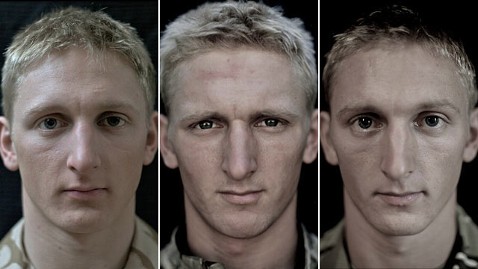 Second Lieutenant Adam Petzsch, 25.
Second Lieutenant Adam Petzsch, 25.
6th March , Edinburgh: "I suppose I am a bit apprehensive but I want to see what it is really like'. It is what I joined the army for but I don't know what to expect."
19th June, Compound 19, Nad-Ali After the IED: "It was my first IED incident and first casualty. You don't think about it 'till afterwards though as your priority is getting the guy away and back into safety. Then you start thinking about what happened, if it was preventable, if it was your fault in anyway and how the others are doing. Before we were on this op I was thinking about how quiet the tour had been and that we had to be careful and fight complacency."
10th October, Edinburgh: "We took over a new compound and if we ventured any more than 2-300 metres we got shot at. At the start of the tour you could patrol kilometres away and no one would touch you. But I think yes, in parts we are making a difference."
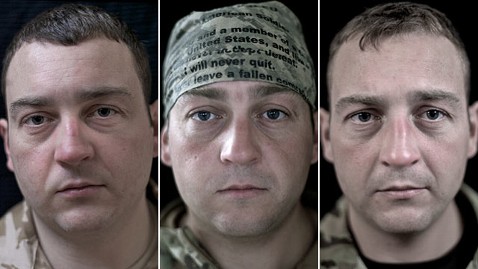
Private Steven Anderson, 31.
March, Edinburgh: "I think its going to be horrible to be honest. The work will be intense and there are going to be a lot of casualties. I am scared not of dying but of losing my legs - that would be the worst."
June, PB Pimon, Nad-Ali: "Its hard to explain the conditions, how dirty it is. Often when you phone your girlfriend or something and she asks why you aren't talking normally, it's… youre drained, you're tired, you're dirty, you've not eaten properly for a few days. Lack of water. You're just drained. I was scared on the first patrol but you think back to the training and remember all the drills. I haven't been in any fire fights and am happy for it to stay that way and to go back home with all my fingers and toes intact."
October, Edinburgh: "We try and go there to win their hearts and change their minds… but those people are living until 45 and dying as there's so much poverty and not the medicines to treat them. And they put different value on life. A child got killed, it was nothing to do with the Army it was just ill. They brought the body of that child to an army camp having shot it saying that it got caught in a fire fight and demanding money. How can you change the mind of someone like that?"
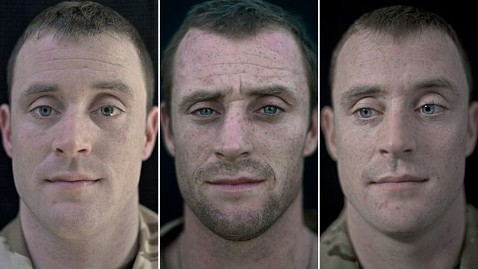
Private Dylan Hughes, 26.
11th March, Edinburgh: "I am not afraid of going out to Afghanistan. It's my job at the end of the day, But I am afraid of f**king up and someone else dying."
17th June, Compound 19, Nad-Ali after the IED: "I was stunned after the explosion. And then we were contacted by Taliban snipers. It wasn't a nice feeling. Not nice at all. It makes you think, it could have been me. It is just luck at the end of the day. Basic living is difficult. It is what I enjoy - living in the field and that, but I think even I will be at breaking point soon though."
6th October, Edinburgh: "To be honest I felt quite sorry for the wee lassies as the women get treated like s**t out there. They've got that to look forward to. … I think we are just fighting a losing battle to be honest with you. But it's not my place to say. I don't know about the politics side of it. I came back in August my missus was having a bairn. It wasn't hard to adjust being back it ws just the change in tempo - coming back and doing nothing. I found myself quite ajitated a lot of the time and had to keep myself busy. I was kind of like, what gives me the right to go home early just because I am having a bairn?"
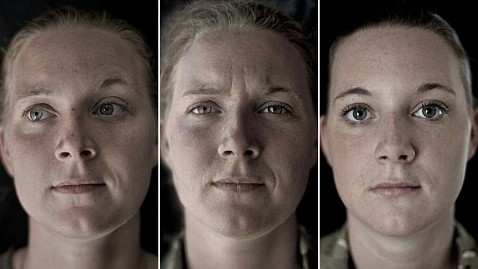
Private Becky Hitchcock, 23.
13th June, PB Khamar, the day before Operation Tor Lari Pakawal: "My civvie friends think I am brave but I don't see it like that at all. It looks so bad on the news but its alright really. I was scared just before leaving the UK - I didn't know what to expect. I haven't been scared here but I know there will be times when I will be."
19th June, Compound 19, Nad Ali, after the IED: "The first casualty I dealt with was just a shrapnel wound but the Afghan one this morning was serious. His eyes were wide open but his face was just white and I thought he was dead. But he grunted. Me and him were exposed to the firing which was really scary but I managed to drag him on the other side of the ditch. He had lost his right leg above the knee - it had completely gone. His left leg, I went to pick it up around the calf but every bone was shattered. The skin of it was under his back so I had to pull it down. It was thick like leather. It smelt…it's a hard smell to forget. I can't even describe it. Just burnt, rotting flesh."
2nd November, Derby: "A day after that IED it came over the radio that the Afghan soldier was in intensive care but stable. That was the best feeling ever. A few months later I treated a little boy with burns to his whole body. He was dead tiny, a lovely looking lad. We made him stable - stable enough to get to Bastion. But two days later his body went into shock and he died. They had to return the body for us to hand back to the family. Carrying him dead having carried him alive two days previous… it was a weird feeling. But it's part of the job. I think I have grown up a bit, and see the light a bit more. I don't think I take things for granted as much as I used to. It makes you appreceiate what you've got and how little others have but still get by."
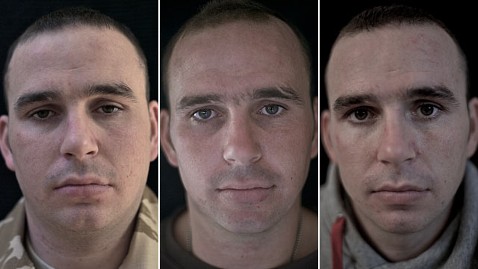
Lance Corporal David McLean, 27.
10th March, Edinburgh: "I'm not really bothered about going. I'm a soldier and it's my job. We've been training for so long it will be good to finally get out there."
12th June, PB Pimon, Nad Ali: "Nothing has really happened so far, it's quiet and I'm a bit bored. When we are at canal checkpoint there is only 10 of us so we are quite close knit. The food is a bit stinking and you get sick of pasta and rice. What do I miss? Home, women and alcohol. Simple."
11th October, Edinburgh, shot in the leg: "I only had 10 days, a week or so to go. I was front man of the patrol. We crossed a wee ditch I turned round to give the second man a hand out. We patrolled through a set of trees and as soon as we broke through someone opened up on us. I could just feel warm on my calf and we rolled into the ditch. We shouted 'man down' and the boys came out with a stretcher but the ditch was too narrow and that's when I started casevaccing myself. You don't really think about it at the time, the adrenaline was buzzing. Within half an hour I was on the chopper and the next day in Selly Oak."
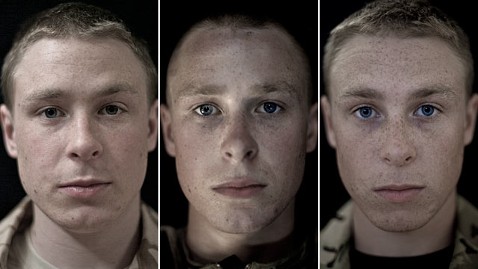
Private Fraiser Pairman, 21.
11th March, Edinburgh: "Aye I suppose I am scared of IEDs but I just can't wait to get out there now. I am going to miss my girlfriend and deep fried pizzas though."
11th June, PB Tofan, Nad-Ali: "It's been alright apart from the heat. The locals are nice and we bought water melon off them. But the first time I was contacted I kept thinking, how the f**k did I end up here? And then just wanted to get out. I keep a St. Christopher in my sleeve. If I lost it I wouldn't go on patrol."
6th October, Edinburgh: "You get used to the sound of gunfire quickly and don't think about being scared. There was one time we got ambushed from all sides and were stuck there for 24 hours.People were running all over the place with no order. It doesn't feel like I've been away for 6 months but it is good to be back and good to see the relief on my mum's face. I stood in the shower for half an hour the other day. And I like clothes so it is a relief to get back into normal clothes and to try and be normal. It will take a few weeks but you have to get used to it."
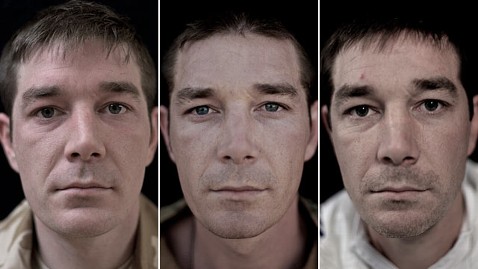
Corporal Steven Gibson, 29.
11th March, Edinburgh: "I am afraid of not coming back home. I have two children and a third on the way in August and I love them and my wife more than anything in the world. Not coming back and seeing them again… that would be the worst."
10th June, Nad Ali: "A lot of the guys have bibles with them - they know it's a split second from going from bad to worse. I have read up to p27. I have never read the bible before. This place opens your eyes up. You hear op minimise come one and it brings it all home. You know that somewhere a soldier has been badly injured or worse and you think about their famillies. So reading the bible, well it is like trying to make peace with someone, the big man upstairs."
15th October, Edinburgh, Blown up in an IED. Sustained back injury: "Without fail I always had my St Christopher on my dog tags. Apart from one day when I couldn't find them anywhere and had to use my spares. And then 3 hours later, boom. I don't know how to describe it. It's like… you know when you are about to faint and you get that fuzzy feeling… I never heard the bang but I went up and over. Everything was fine until 10 minutes later when the adrenaline stopped. It was like someone had stuck something in my back. I fell to the floor and was just in agony… I didn't want to get sent home but had no choice. Without a shadow of doubt I am still finding it hard to adjust; I still look back. I'll go out for a cigarette and constatnly thinking about Afghan."
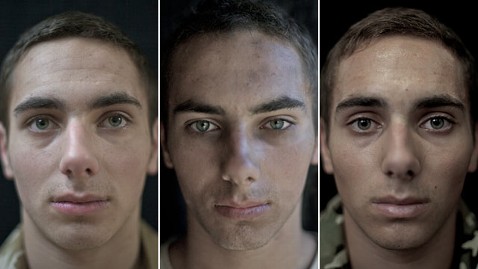
Private Matthew Hodgson, 18.
11th March, Edinburgh: "Aye I am looking forward to it now that we are going but I am scared of losing my best mates more than myself. Its the casualties that I am afraid of. There are going to be so many."
19th June, Compound 19, Nad Ali, after the IED: "It was really frightening. You see the IED blast and you wonder who got hit. It wasn't a nice thing to see. It dawns on you how real it all is and then you try not to think about it. You try not to think about it at all. That patrol was pointless and now an Afghan soldier is missing his legs and for what?"
12th October, Edinburgh: "You try and explain what it was like where you were but people have not got a clue. The food - not getting a proper meal or sleep. And you are just drained after a patrol. Absolutely drained. And it was pretty scary at times. When you are in contact at first it's just 'get down'. Afterwards it hits you… 'I was getting shot at, that was close'. At the time you don't think about it you do what you have to. Now I am home I find I get frustrated at smaller things. I get wound up. I never used to though."
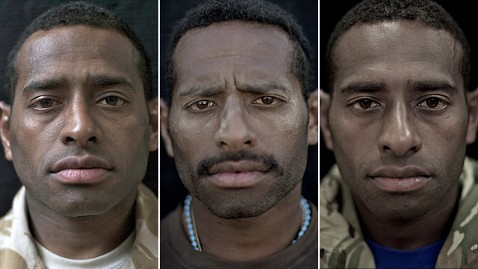
Private Jo Yavala, 28.
9th March, Edinburgh: "I am going to miss my family. I have been to Iraq before but not Afghanistan. I don't know what to expect but am looking forward to getting out there now."
Compound 19, Nad Ali, after the IED: "I had a funny feeling about this patrol. heard the bang and heard on the radio 'man down' … It was the first casualty I have seen. It was pretty awful. I saw the medic treating him, He had no leg. I went back to where it had exploded and then saw his boot floating in the water. Just an empty boot."
10th October, Edinburgh: "In the morning when I wake up and in the evening before bed. But out there I was just praying all the time, thinking of my family at home. Sometimes I'd pray during during a patrol itself. I was scared. Especially when in contact, you don't know what will happen. I was expecting the worst. Right now I feel a little bit angry, sometimes my temperture rises very quickly especially if I stay too long inside. Sometimes I miss being with all they guys. For the first few days I had difficulty sleeping. I dreamt about different things that happened in Afghan. A few nights I woke up crying."
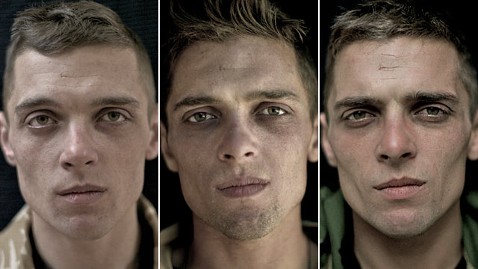
Private Chris MacGregor, 24.
11th March, Edinburgh: "Obviously I'll miss family but other than that I am going to miss my dogs more than anything. They are my de-stressers and keep me sane. I think I'll miss TV too though. I try not to think about the worst case scenario."
19th June, Compound 19, Nad Ali, after the IED: "Most people get used to being away from home but I find it hard. It's your fear that keeps you alive here. But I believe if it's going to happen, it's going to happen and theres nothing you can do about it. If the big man upstairs could do anything, there'd be no dead soldiers. They'd all be alive. It still hurts when you hear about a soldier dying. You think about what their families are going through. You ask what they died for and what we are achieving here. I am not sure any more. That Afghan soldier loosing his legs just now… I don't know…."
28th August, Edinburgh, casevaced due to sustained knee injury from Iraq: "My legs just gave up. I think it was the weight - 135 pounds or something. I just had to accept, my body was telling me to give up as I had pushed it. I was telling it to go, it was telling me to stop. When squaddies come back they still have a lot of adrenaline and anger in them. I had to have anger management after Iraq. If I get like that now, I just go for a walk with the dogs. It is the best way to deal with it, instead of being all tense and ready to snap at folk. The first thing I did when I came back, appart from kissing and cuddling the misses and my bairn, was go for a massive walk with the dogs. I walked for miles and miles not caring where I stepped."
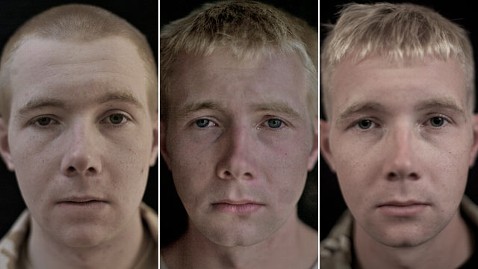
Private Sean Patterson, 19.
11th March, Edinburgh: "I am going to say good bye to my family early as I hate good byes. I am going to miss them. I'm not scared though, I can't wait! I joined the army when I was 15 - it is all I wanted to do and I can't wait to get out there."
20th June, Camp Tombstone, being 'TRIM'med (Trauma Risk Management): "…It was horrible. When we got back to safety I broke down crying. We all did. I couldn't sleep that night. I was thinking about home and staring at the stars. I had R and R a few days after that and for the first couple of nights I had nightmares and flashbacks; I woke up in pure cold sweat. When I got back and out on the ground again we were under fire and another two guys had to be casevaced after losing limbs. It was s**t seeing it happen all over again. It wasn't nice at all. I say a prayer before I go on patrol now but I still think 'am I going to come back in one piece or with a leg missing?' I'm scared every time I leave for a patrol. I hate it. It is 84 days left until I go home."
7th October, Edinburgh: "People think you can just sail through life but it is not as easy as that. You could get hit by a bus and that would be that. You never know what is going to happen - especially out there. You could go out on patrol and that could be you. Finished. I reckon we should leave them to do their own thing. We have lost too many. You see guys coming back missing 3 limbs. They're not going to be able to get a job on civvy street are they. So I don't really see the point. It's not as if we are going to gain anything in Afghanistan, are we? It's their own problem. Deal with it."
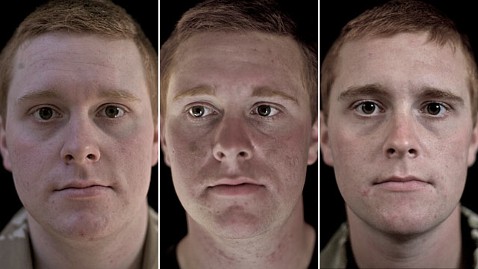
Private Michael Swan, 20.
11th March, Edinburgh: "Yes I am scared. I can't wait to get out there though and to do the job we have been training for. But I get homesick really easily so I think I am going to find it hard at first and will miss my family loads. Saying Goodbye is going to be hard."
11th June, PB Pimon, Nad Ali: "Before I came out here I was like, 'losing one limb wouldn't be so bad' but now all I want to do is get back in one piece. I miss home so much - I hate being away. I used to want to see more action, but then I went on R and R and saw all my family and friends. Now I just want to go home."
6th October, Edinburgh: "We got hit on a road move. I was knocked out and woke with Bisset's fingers in my mouth. They thought I was dead and he was shouting 'man down, man down' on the radio. Afterwards it starts to affect you and you realise you are not invincable. I kept thinking about how my family would deal with me dying - or being disfigured or dismembered or something. You think about your family more than yourself. They are the ones that have got to deal with it if you die. Being back is strange. You are away for so long and you think about how you lived so basically. It makes you appreciate things a lot more. Makes you appreciate life more. But find I get frustrated easily and lose my temper. My family say I am a lot more aggressive. I used to be a really placid guy, you know, really hard to upset but now it is quite easy."
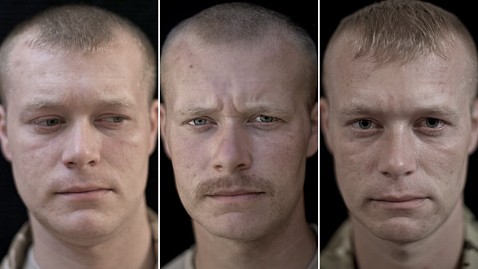
Lance Corporal Sean Tennant, 29.
11th March, Edinburgh: "I am looking forward to getting back and for the 6 months to be over. All this talk of being excited to get out there is rubbish. The younger lads will get a shock. I am going to miss flushing toilets and having a long shower whenever I want"
11th June, PB Zeal, Nad Ali: "I cant remember how long I have been here. I was in Babaji before where our compound was under fire a few times. I wasn't scared though as I have been shot at plenty of times before in Iraq. IED's are the biggest scare here though. It takes a while to get used to that - and when you are on the ground you eventually realise that not every step you take is going to blow you up. So long as you don't get complacent."
6th October, Edinburgh: "You see them firing at you and it's like a Mexican stand off. But it's always an ambush so you get a fright to start with but you just deal with it. You try not to think about it too much otherwise you get yourself wound up. Are we making a difference? One of my friends died and then there are all the boys who've been injured…It isn't worth that. It's great being back but I'd say I've got a shorter fuse now. I ended up arguing with my partner but its small things that can cause that. It's a funny one. There are small things that can get on your nerves. Supermarkets are bad because there are bright colours and everone walks about like lemmings. It seems like people don't have any purpose here."
Artist Statement: I began working with A Company, 1st Battalion the Royal Regiment of Scotland (1 Scots) in January 2010, 3 months before they deployed and joined them on the end of their training, thereby building friendship and trust with individuals. The 'before' portraits were taken the day before they deployed. The 'during' shots are almost exactly 3 months into their deployment in Nad-Ali and the 'after' shots were taken the week they returned almost 4 months later apart from those who were sent home with injuries.
It was a very personal project and stemmed from having embedded with the military on and off for 4 years in Iraq and Afghanistan and bearing witness to how many young men return as shadows of their former selves and, in many cases, with deep, psychological scars. As the body count of British servicemen killed or wounded rose and the political ramifications of the British army's presence in Afghanistan became increasingly convoluted, more and more soldiers felt like they didn't have a voice, or at least, weren't being listened to. 'We Are The Not Dead' is an attempt at giving the brave young men and women the chance to explain how it really is.
Photography and text by Lalage Snow